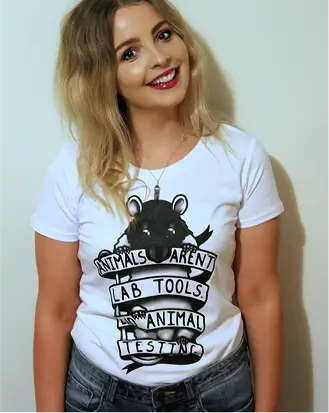Outdated Laws & Regulations
While New Zealand is one of the countries that at least have laws in place to protect animals, they fall short in several aspects when it comes to animal use for science.
Animal protection laws
The main legislation addressing animal protection is the Animal Welfare Act 1999.1 However, animals used for science are not given the same rights or protections as other animals.
In fact, part 6 of the Animal Welfare Act covers the use of animals for research, testing or teaching purposes, and it grants exemptions to most requirements in the Animal Welfare Act. This means that animals used for science are left vulnerable and can be used in ways that would usually be considered illegal. Additionally, some animals (for example insects) are not covered by the Animal Welfare Act.
Codes of Ethical Conduct
According to the Animal Welfare Act, anyone can apply to the Director-General for approval of a Code of Ethical Conduct to use of animals for science.
Any person or organisation using animals for science must follow an approved Code of Ethical Conduct, which sets out the policies and procedures that must be followed by the organisation and its animal ethics committee. These are enforced by the Ministry for Primary Industries (MPI) and the National Animal Ethics Advisory Committee (NAEAC).
Regulatory bodies
MPI
One of the responsibilities of the MPI is to oversee part 6 of the Animal Welfare Act. In practice, they:
- Collate statistics and report on the number of animals used for science each year2
- Respond to complaints if/when they are made
- Review Code holders and their animal ethics committees every five years.
MPI also provides information for Code holders and Animal Ethics Committees (AECs); for example, they publish a Good Practice Guide and a template for a Code of Ethical Conduct.3
Approximately 300,000 animals are used for science each year in New Zealand. That means around 1.5 million animals will be used per 5-year audit cycle. Do you think one check-in is enough to ensure all animals are protected? Because we don’t!
NAEAC
Animal Ethics Committees are overseen by the National Animal Ethics Advisory Committee (NAEAC). NAEAC is appointed to provide independent advice to the MPI and its Minister, the Director-General, AEC's and others relating to the use of animals in research, testing and teaching.
NAEAC also attend a limited number of animal ethics committee meetings each year where they check on the implementation of the 3Rsprinciple (the replacement, reduction or refinement of animal use).4
Animal Ethics Committees
AEC’s have the most power over the use of animals for science in Aotearoa. The Government leaves it up to these committees to approve and monitor the use of animals for science.
People can apply to use animals for a specific project by submitting an application to an animal ethics committee. These applications include what individuals want to do with the animals and why. The format of applications is not the same for each AEC.
Each animal ethics committee consists of at least four members, including at least one each of:
- a senior member of the organisation
- a nominee of an approved animal welfare organisation (the only such approved organisation in NZ being the SPCA)
- a nominee of the New Zealand Veterinary Association
- a layperson nominated by a local body.
However, ultimately, it is the organisation using animals for science that assembles their AEC - the organisation’s chief executive appoints the AEC members.
How animals can't be used
In New Zealand it is illegal to:
1. Test cosmetics on animals: Thanks to the #BeCrueltyFree campaign that NZAVS was a part of, testing cosmetics on animals in Aotearoa has been banned. You can read more about this victory here.
The Animal Welfare Act 1999 prohibits the use of animals for developing, making, or testing a cosmetic or developing, making, or testing an ingredient that is intended exclusively for use in a cosmetic in NZ.5
However, this does not forbid:
- using animals to test an ingredient that is used in cosmetics but is being used for another purpose
- the sale of cosmetics in NZ that have been tested on animals.
This means that animal-tested cosmetics can still be imported, and animal testing of New Zealand products can still be conducted overseas for international market requirements. Cosmetics ingredients can also still be tested if used for non-cosmetics purposes.
2. Test legal highs on animals: The Psychoactive Substances Act 2013 prohibits the consideration of data from animal tests (that have been conducted in NZ) for assessing the safety of psychoactive products.6
Our campaign to ban testing psychoactive substances on animals,such as party pills, was a huge success. With the help of several other organisations, we persuaded the government to leave animal data out of testing for psychoactive substances – including experiments conducted overseas. You can read more about this win here.
3. Test on gorillas, chimpanzees, bonobos, or orangutans: The Animal Welfare Act 1999 prohibits the use of gorillas,chimpanzees, bonobos, and orangutans (non-human hominids)unless approved by the Director-General.7
Requirements for Animal Testing in NZ Law
Animals are used each year for science in Aotearoa because of outdated regulatory requirements. Some legislation and standards require data from animal tests to try and prove the safety and efficacy of foods, chemicals and more!
Thanks to the support of LUSH Cosmetics, we were able to commission a legal review of the current requirements for animal testing in NZ law. So now we know exactly what outdated laws we need to change first!
The team of lawyers examined NZ law covering
- Medicines and Medical Devices: Requirements for animal tests were discovered.
- Veterinary Medicine: Requirements for animal tests were discovered.
- Hazardous Substances (Including Cosmetics): Requirements for animal tests were discovered.
- Various Areas where no requirements were found included:
- Consumer products (general and regulated)
- Electric and gas products and appliances
- Food and items in contact with food
- Pet food
- Psychoactive substances
- Vehicles and vehicle equipment
- Workplace products
- Vaping products
1. Medicines and Medical Devices
Animal testing is required in drug development, where it’s unethical to test on human beings. For example, tests are expected to determine if a medicine may negatively affect gene expression, cause cancer, or be dangerous for pre-birth development.
As the animals need to be autopsied to measure the effects, they do not survive these tests.
2. Veterinary Medicines
Animal testing is required for new products and when existing products are modified.
Examples of some of the animal tests required:
- Administering a product to an animal and gathering information on the residue levels in a specified number of animals over one or multiple time points.
- Identifying any metabolites and the quantities present in different animal tissues (such as fat, muscle, kidneys) and waste matter discharged from the body (i.e. faeces and urine).
3. Hazardous Substances
Animal testing is required for: Eye irritants, substances corrosive to ocular tissue, and substances ecotoxic to terrestrial vertebrates and invertebrates. Tests required can be for:
- Acute oral toxicity8
- This test normally uses rodents.
- The test substance is administered in a single dose to animals fasted prior to dosing The first animal is dosed slightly below the median lethal dose (LD50). The second animal receives a lower dose (if the first animal dies) or a higher dose (if the first animal survives).
- All animals are observed and autopsied.
- Acute dermal toxicity9
- Groups of animals of a single-sex are exposed to the test chemical over the skin.
- Observations of effects and deaths are made. Animals who die during the test are autopsied.
- At the end, the surviving animals are killed and autopsied.
- Acute inhalation toxicity10
- The preferred species for this test are rats.
- Animals are exposed to a pre-defined concentration of the test substance through inhalation chambers. Animals are then observed for clinical signs of toxicity.
- All the animals are ultimately killed and autopsied.
- Acute Skin irritation/corrosion11
- Albino rabbits are most commonly used for this.
- The animal methods generally involve the application of the test substance to an area of skin.
- The animals are then observed for signs of irritation (i.e. redness and swelling) for 14 days.
- Acute eye irritation/corrosion12
- Albino rabbits are most commonly used for this.
- The test substance is applied to one eye of each animal.
- The nature and severity of the lesions and their reversibility or lack of reversibility are then observed. Topical anaesthetics and system analgesics can be used to minimise pain and distress.
- Skin sensitisation13
- Guinea pigs are primarily used, but mouse models are also accepted.14
- The test animals are exposed to the test substance on their skin or via an injection just under their skin.
- All skin reactions and any unusual findings are then observed and recorded.
- https://www.legislation.govt.nz/act/public/1999/0142/latest/dlm49664.html
- https://www.mpi.govt.nz/animals/animal-welfare/animals-research-testing-teaching/statistics-on-the-use-of-animals-in-research-testing-and-teaching/
- https://www.mpi.govt.nz/animals/animal-welfare/animals-research-testing-teaching/
- https://www.naeac.org.nz/advice-and-reports/
- https://www.legislation.govt.nz/act/public/1999/0142/latest/dlm49664.html
- https://www.legislation.govt.nz/act/public/2013/0053/latest/dlm5042921.html
- https://www.legislation.govt.nz/act/public/1999/0142/latest/dlm49664.html
- https://www.oecd.org/en/publications/test-no-423-acute-oral-toxicity-acute-toxic-class-method_9789264071001-en.html
- https://www.oecd.org/en/publications/test-no-402-acute-dermal-toxicity_9789264070585-en.html
- https://www.oecd.org/en/publications/test-no-403-acute-inhalation-toxicity_9789264070608-en.html
- https://www.oecd.org/en/publications/test-no-404-acute-dermal-irritation-corrosion_9789264070622-en.html
- https://www.oecd.org/en/publications/test-no-405-acute-eye-irritation-corrosion_9789264185333-en.html
- https://www.oecd.org/en/publications/test-no-406-skin-sensitisation_9789264070660-en.html
- https://www.oecd.org/en/publications/test-no-442b-skin-sensitization_9789264090996-en.html





